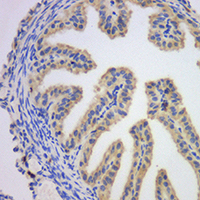 Smart Citations
Smart CitationsSee how this article has been cited at scite.ai
scite shows how a scientific paper has been cited by providing the context of the citation, a classification describing whether it supports, mentions, or contrasts the cited claim, and a label indicating in which section the citation was made.
LncRNA GClnc1 may contribute to the progression of ovarian cancer by regulating p53 signaling pathway
Ovarian cancer (OC) is one of the most prevalent and deadly types of gynecological malignancy. Since current treatments are not effective against OC, it is imperative to develop novel potential therapeutic targets for managing OC. In this study, we aimed to uncover the underlying molecular mechanism of long non-coding RNA (lncRNA) GClnc1 related to p53 signaling pathway in OC. The expression of lncRNA H19 GClnc1 was markedly higher in OC samples than the related normal tissues. Next, we found that lncRNA GClnc1 inhibited p53. In addition, the lncRNA GClnc1 overexpression promoted the cell proliferation and migration in vitro. Subsequently, p53 silencing obligated the effect of lncRNA GCln1 knock down on cell proliferation and migration. To sum up, LncRNA GClnc1 contributes to the progression of OC by regulating p53 signaling pathway. Meanwhile, our findings also suggested that lncRNA GClnc1 may serve as a novel therapeutic target for OC patients.
Downloads
Publication Facts
Reviewer profiles N/A
Author statements
- Academic society
- N/A
- Publisher
- PAGEPress Publications, Pavia, Italy
How to Cite
PAGEPress has chosen to apply the Creative Commons Attribution NonCommercial 4.0 International License (CC BY-NC 4.0) to all manuscripts to be published.

 https://doi.org/10.4081/ejh.2020.3166
https://doi.org/10.4081/ejh.2020.3166






